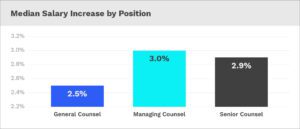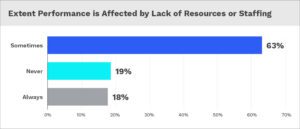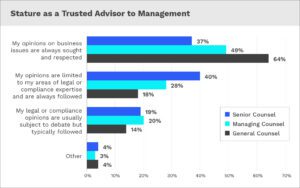Tracking the Evolution of In-House Counsel Compensation in 2025

By Katie Gilmore
July 8, 2025

Katie Gilmore is a Managing Director at BarkerGilmore, a top legal recruiting firm for in-house counsel and compliance talent, where she specializes in recruiting senior-level in-house counsel and compliance professionals for a diverse range of clients, including publicly traded Fortune 500 companies, private equity-backed businesses, and mission-driven non-profits. She can be reached at kgilmore@barkergilmore.com.
Published in Today’s General Counsel, September/October 2025
Over the past few years, the general counsel position has become one of the most consequential roles in the C-suite. For many lawyers, it represents a career pinnacle and a platform to play an important role in enterprise success. However, the rate of in-house counsel compensation growth has slowed in the current climate against a backdrop of macroeconomic uncertainty and market volatility.
Companies appear to be exercising greater discretion in GC compensation planning, even as they lean more heavily on that role to guide strategic decisions through turbulent times. In 2025, the median salary increase for GCs was 2.5%, a notable slowdown from the 4.4% rise reported in 2024, according to BarkerGilmore’s 2025 In-House Counsel Compensation Report, conducted in February and March of 2025. Based on a survey of more than 2,700 legal professionals, the report sheds light on compensation trends, career paths, and leadership traits that define today’s successful GCs.
Bonuses Steady Despite Headwinds
This slowdown in compensation growth likely reflects broader market headwinds, including economic and political uncertainty, tighter corporate budgets, and volatility in sectors including tech and finance. Not surprisingly, nearly 60% of in-house counsel surveyed indicated they are considering new opportunities in the coming year, citing better compensation and benefits as key motivators.
Offsetting the slower growth in base salaries, cash bonuses for in-house counsel were paid 93% of their target, basically unchanged from last year. This reflects high satisfaction levels with GC performance over the past year, as well as an effort to reward and retain top legal talent who were anticipating a more significant salary increase.
Despite softening of compensation growth, most in-house legal counsel are not concerned with losing their jobs, likely because most companies will continue to need legal talent. It’s notable, however, that a sizeable minority (39%) said they are worried about job security, during the period in early spring when layoffs at major companies, and Department of Government Efficiency (DOGE)-related job eliminations were daily news headlines.
A striking 81% of in-house lawyers report that staffing or budget limitations often hinder their ability to deliver on the growing demands of the role. On an enterprise level, companies are increasingly reluctant to add staff or overhead in the current economic environment, where much publicized on-again, off-again tariff-related decisions and supply chain uncertainty are putting the brakes on most decision-making.
Charting a Course to the GC Role
In-house counsel aiming to elevate their careers can take strategic, data-driven steps that align with the key trends highlighted in this year’s report.
- Develop business fluency. Trusted general counsel are deeply integrated into business strategy. Again, according to the report, 64% say their input on business issues is always sought and respected, a key differentiator at the executive level.
- Target high-opportunity sectors. Life sciences and energy continue to lead in compensation levels, reflecting both complexity and strategic importance. Legal professionals in these sectors reported the highest median total compensation.
- Benchmark thoughtfully. With top GC compensation ranging from over $4.5 million in public companies to $2 million in nonprofits, understanding where your compensation stands — and how it compares to peers in similar roles — is essential to career strategy.
Beyond the Paycheck: Traits of Successful GCs
Compensation offers only one perspective on the value of the general counsel role. Often, the most significant distinction comes from how these legal leaders are perceived and positioned within their organizations.
One standout trait among successful GCs is their status as trusted advisors. According to the report, 64% of current GCs say their input on business issues is always sought and respected. This level of influence drops off among managing counsel (49%) and senior counsel (37%), highlighting how trust and credibility, particularly with CEOs and boards, are key to ascending the legal leadership ladder.
Surprisingly, staying in the same role long-term doesn’t always correlate with upward mobility. In fact, 57% of current general counsel have held their position for five years or less, while only 13% have stayed in the role for over a decade. This pattern suggests timely moves, whether through internal promotions or external opportunities, can be a key driver of career advancement.
However, meaningful professional growth and increased economic rewards require more than technical legal skills. It calls for intention, focus, and the ability to establish credibility across the organization. Legal professionals at all levels of the organization must consistently demonstrate their value beyond the legal silo by engaging in cross-functional collaboration, communicating clearly, and leading with influence.
While the path to general counsel is rarely linear, it is increasingly attainable for those who commit to pairing legal acumen with business savvy. Strategic thinking, a growth mindset, and the patience to build influence over time can position in-house counsel not just as legal experts, but as integral architects of their companies’ success.
Critical intelligence for general counsel
Stay on top of the latest news, solutions and best practices by reading Daily Updates from Today's General Counsel.
Daily Updates
Sign up for our free daily newsletter for the latest news and business legal developments.





